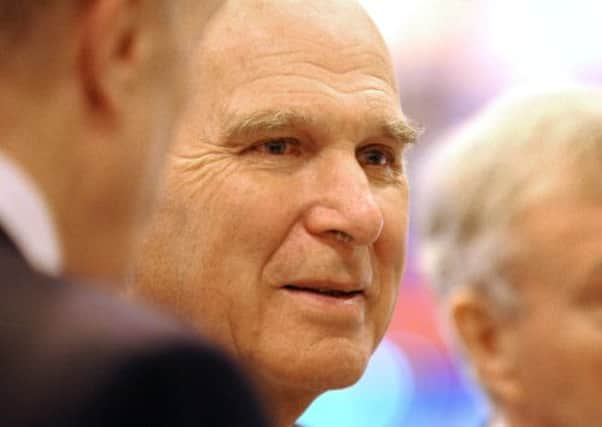Minister pours cold water on Heseltine proposals


Speaking at lunch of regional journalists, the Business Secretary said LEPs are too small and unaccountable to be handed “large chunks of public money” in the way Lord Heseltine envisaged in his blueprint for growth.
Mr Cable said that rather than accepting Lord Heseltine’s plan wholesale, the Government will instead look to extend its existing ‘City Deals’ programme, where groups of councils club together to ask for new powers and funding from central Government.
Advertisement
Hide AdAdvertisement
Hide AdThe Liberal Democrat’s comments represent the first public opposition to the Heseltine report from a senior Government Minister since its publication last year, and come just two months before Chancellor George Osborne unveils his crucial post-2015 spending review on June 26.
Mr Osborne has publicly embraced Lord Heseltine’s plan to devolve large sums of public money to local areas and promised concrete action in the spending review, without yet putting a figure on how much money will actually be made available.
The Yorkshire Post is campaigning for the proposals to be implemented as swiftly as possible.
Mr Cable insisted the Government “is not saying ‘no’ to Heseltine” – but made clear it is planning something far less dramatic than the massive overhaul of public spending set out by the peer.
Advertisement
Hide AdAdvertisement
Hide Ad“What will happen in practice, and what we’re heading towards, is a development of the City Deal model,” Mr Cable said, referring to the Government’s ongoing programme to hand extra powers to local councils around the country.
“We’ve now got the eight big cities (with City Deals), we’ve got 20 going through the pipeline, and we’ll go beyond that to semi-rural, smaller cities.
“Each of them will put a proposition to Government – ‘we would like to do a bit of local skills training in our own way, we will do a bit of business support in our own way’ – and if we judge on negotiation this is a good deal, they’ll get the money and just get on with it.
“That’s how it will happen, rather than the slightly caricatured picture of Heseltine, where the Government just hands out billions to some local enterprise partnership and they just spend it the way they want. It’s not going to happen that way.”
Advertisement
Hide AdAdvertisement
Hide AdIn his report, Lord Heseltine praised City Deals as a “welcome” step on the road to making England a less centralised country – but made clear such a “piecemeal” approach was not enough to kick-start growth.
“We need to go further and faster to achieve an essential rebalancing of central and local power and resources,” he wrote.
The Tory peer also made clear he believes the business-led LEPs are the best bodies to take control of the extra funding to spend on local growth initiatives such as skills training, transport investment and new housing.
But Mr Cable dismissed this out of hand, insisting any devolved funds would be handed to democratically-elected local councils.
Advertisement
Hide AdAdvertisement
Hide Ad“Hardly any (LEPs) come up to me and say ‘we’d like billions more to spend’ – that’s not the way they think,” he said. “So it’s a false premise to say that’s where we should be starting from.
“There’s an issue around capacity, because they’re quite small groups. And there’s an accountability issue. They’re self-elected.
“It’s not a bad model, but you can’t hand over large chunks of public money with limited controls to that kind of structure.”